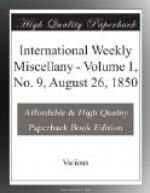THE CHEMISTRY OF A CANDLE.
The Wilkinsons were having a small party,—it consisted of themselves and Uncle Bagges—at which the younger members of the family, home for the holidays, had been just admitted to assist after dinner. Uncle Bagges was a gentleman from whom his affectionate relatives cherished expectations of a testamentary nature. Hence the greatest attention was paid by them to the wishes of Mr. Bagges, as well as to every observation which he might be pleased to make.
“Eh! what? you sir,” said Mr. Bagges, facetiously addressing himself to his eldest nephew, Harry,—“Eh! what? I am glad to hear, sir, that you are doing well at school. Now—eh? now, are you clever enough to tell where was Moses when he put the candle out?”
“That depends, uncle,” said the young gentleman, “on whether he had lighted the candle to see with at night, or by daylight, to seal a letter.”
“Eh! Very good, now! ’Pon my word, very good,” exclaimed Uncle Bagges. “You must be Lord Chancellor, sir—Lord Chancellor, one of these days.”
“And now, uncle,” asked Harry, who was a favorite with his uncle, “can you tell me what you do when you put a candle out?”
“Clap an extinguisher on it, you young rogue, to be sure.”
“Oh! but I mean, you cut off its supply of oxygen,” said Master Harry.
“Cut off its ox’s—eh? what? I shall cut off your nose, you young dog, one of these fine days.”
“He means something he heard at the Royal Institution,” observed Mrs. Wilkinson. “He reads a great deal about chemistry, and he attended Professor Faraday’s lectures there on the chemical history of a candle, and has been full of it ever since.”
“Now, you sir,” said Uncle Bagges, “come you here to me, and tell me what you have to say about this chemical, eh?—or comical: which?—this comical chemical history of a candle.”
“He’ll bore you, Bagges,” said Mr. Wilkinson. “Harry, don’t be troublesome to your uncle.”
“Troublesome! Oh, not at all. He amuses me. I like to hear him. So let him teach his old uncle the comicality and chemicality of a farthing rushlight.”
“A wax candle will be nicer and cleaner, uncle, and answer the same purpose. There’s one on the mantel-shelf. Let me light it.
“Take care you don’t burn your fingers, Or set anything on fire,” said Mrs. Wilkinson.
“Now, uncle,” commenced Harry, having drawn his chair to the side of Mr. Bagges, “we have got our candle burning. What do you see?”
“Let me put on my spectacles,” answered the uncle.
“Look down on the top of the candle around the wick. See, it is a little cup full of melted wax. The heat of the flame has melted the wax just round the wick. The cold air keeps the outside of it hard, so as to make the rim of it. The melted wax in the little cup goes up through the wick to be burnt, just as oil does in the wick of a lamp. What do you think makes it go up, uncle?”




